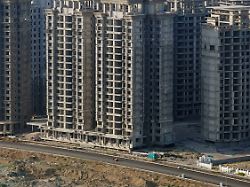The successful model of China’s growth is coming to an end: the export machine is weakening, the real estate market is collapsing, and the Chinese are holding back on spending. The Communist Party has a problem.
The bad news for China’s economy is piling up. This week alone there have been several that are unpleasant in and of themselves. Exports have collapsed, imports have collapsed, giant real estate developer Country Garden is in financial difficulties, and then the country has slipped into deflation. The Chinese model for success is in serious trouble – the export boom is over, but the real estate crisis is not.
The leadership in Beijing had imagined it completely differently. After the end of the tough corona lockdowns, the economy should start with a strong recovery. But things turned out differently. In the second quarter, gross domestic product grew by 6.3 percent compared to the same period last year, but this number is deceptive. Because the draconian corona measures had stalled the economy a year ago.
For the current year, the management in Beijing has decreed the modest growth target of 5 percent overall. To put this in perspective: in the past decade, annual growth averaged 7 percent, in the 2000s it was more than 10 percent.
China’s economic power is no longer suffering from the aftermath of the pandemic, the causes lie deeper. A key problem is that consumption is falling in China. This is particularly alarming for the Communist Party because it wants to change the economic model: away from export dependency towards domestic consumption.
“Give me my salary”
There are many reasons why the Chinese are reluctant to buy. First, there is the troubled, highly indebted real estate sector. The country had experienced a gigantic real estate boom for years – the sector at times made up a good quarter of the country’s entire economy. But now the pump-financed bubble is bursting.
Many Chinese have put all of their savings into apartments and taken on huge debts to buy them – and now they are not only experiencing a collapse in real estate prices. Companies struggle to complete projects due to lack of funds. Customers therefore have to fear that their prepaid apartments will never be built. So it’s not surprising when the Chinese keep their money together.
Meanwhile, in early August, former employees of the real estate group Shenzhen Baoneng beat up boss Yao Zhenhua in front of the company’s headquarters. They accused the billionaire of not paying salaries and stuck notes on the windows of his black Maybach luxury sedan with the demand “Give me my salary”. After the incident, Zhenhua attended a meeting where he announced layoff plans amid liquidity problems.
A vicious circle threatens China: consumers and companies currently prefer to pay off their debts instead of consuming and investing. Many people become more reluctant to spend money because they fear losing their job or a cut in their wages. China’s youth unemployment is extremely high, with one in five 16- to 24-year-olds unemployed. All of this leads to even more caution – and slows down the economy even further.
Imports fall sharply
The reluctance is also reflected in the fact that the general price level in China fell by 0.3 percent in July. However, this should not be overstated. On the one hand, this is mainly due to the fact that the prices for pork – an important source of nutrition in the People’s Republic – have fallen sharply. Second, mild deflation is not uncommon in China.
More worrying is another number: Producer prices fell more than 4 percent, down for the tenth straight month. In the statistics, these prices are listed from the factory gate – i.e. before the products are further processed or sold. They give an early indication of how general consumer prices are developing. Another indicator of weakening consumption: In July, imports fell by more than twelve percent.
The government in Beijing wants to boost the economy. However, the measures implemented so far have not had any significant effect. Unless the housing market recovers and deflationary pressures mount, it will become increasingly difficult to turn the corner.
